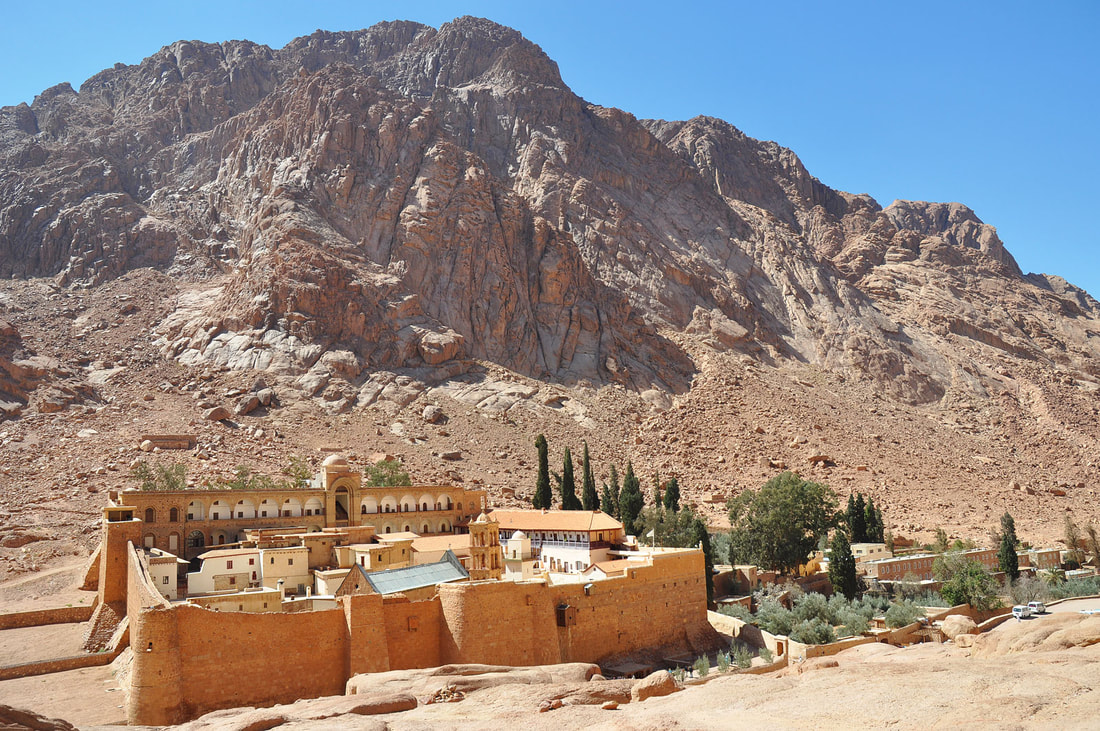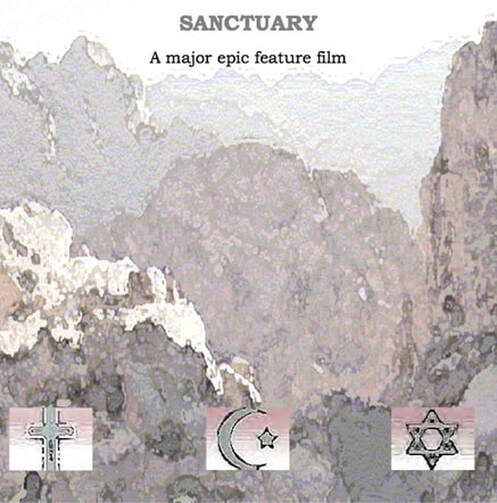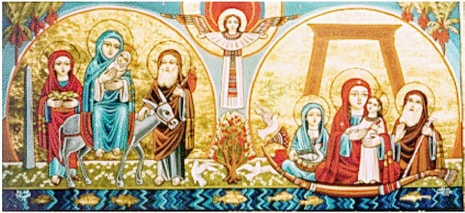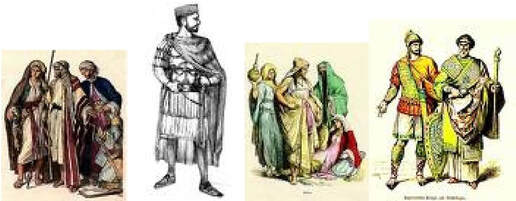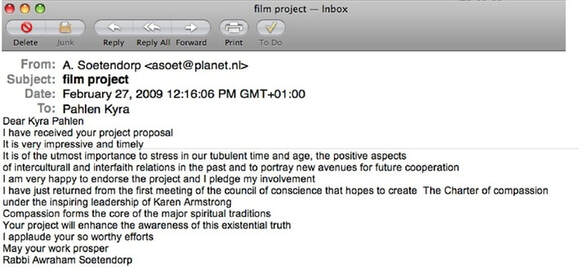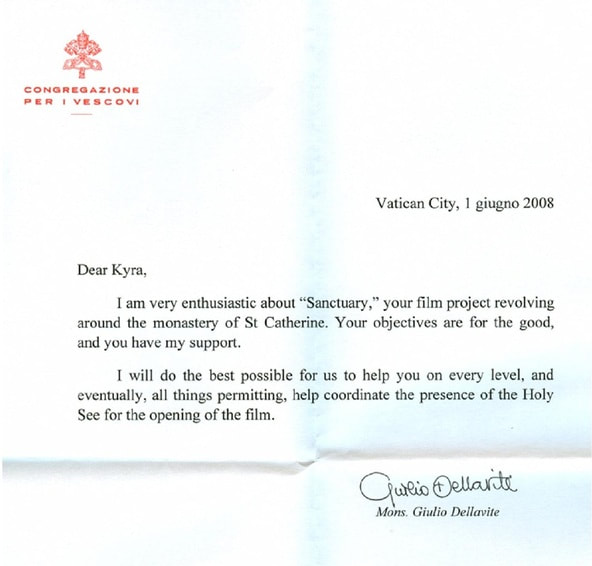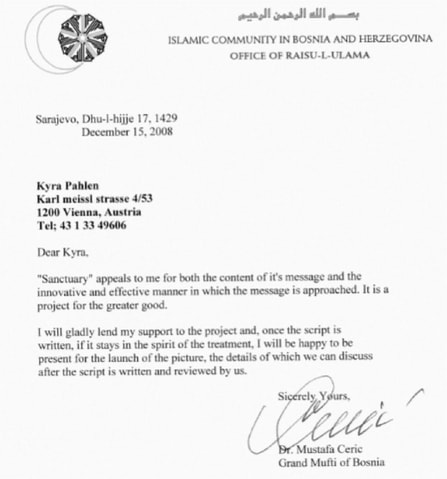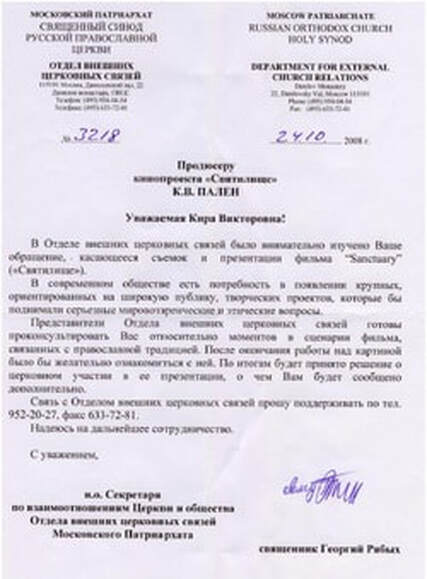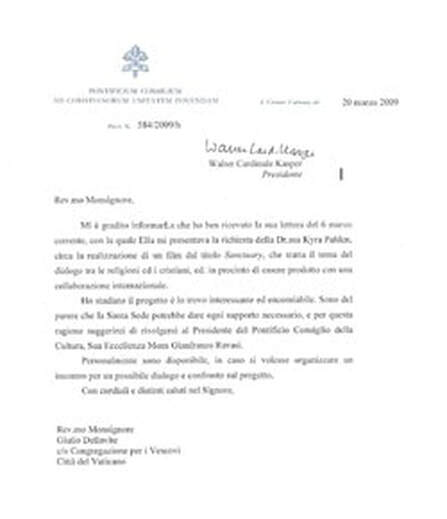Whereas media primarily focuses on moments of conflict;
we believe the world wants to see a film that shows that ...
A moment in world history when all
three monotheistic religions
cohabited in Peace.
Peace has existed in the past, thus can exist now, ... and in the future
Sanctuary the movie
LOGLINE
As two empires clash, our multi-cultured heroes, Sofia and Amir, Rebecca and Demetrios, find love, friendship, themselves, and peace after solving the religious, social and political obstacles of the epoch and battling Sofia’s father’s gambling.
As two empires clash, our multi-cultured heroes, Sofia and Amir, Rebecca and Demetrios, find love, friendship, themselves, and peace after solving the religious, social and political obstacles of the epoch and battling Sofia’s father’s gambling.
SYNOPSIS
We are in the 7th century AD.
The mixed inhabitants of today’s "middle east" are caught between the rapid advance of the Arab Empire, led by the young audacious Khalid ibn al-Walid, welcomed both by the Jews and by the Christians who no
longer condone the Roman Byzantine Empire's rules, and the withdrawal of the Roman Byzantine Empire, led by the aging Eraklio.
Khalid, a lover of poetry, orders his soldier Amir to obtain the older General Eraklio’s poetry.
Amir goes to the Monastery of St. Catherine on Mount Sinai to ask a Priest to help him obtain the poems. The Priest introduces Amir to Sofia through Rebecca, Sofia's “guardian.” Rebecca is a Jewish lady who was Sofia’s dead mother's close friend, and who has been taking care of her since her childhood. Sofia, a young Christian Greek-Roman woman works in Eraklio's palace, and has access to Eraklio’s quarters. After looking deep into Amir's eyes, she accepts to bring him the poems...
We are in the 7th century AD.
The mixed inhabitants of today’s "middle east" are caught between the rapid advance of the Arab Empire, led by the young audacious Khalid ibn al-Walid, welcomed both by the Jews and by the Christians who no
longer condone the Roman Byzantine Empire's rules, and the withdrawal of the Roman Byzantine Empire, led by the aging Eraklio.
Khalid, a lover of poetry, orders his soldier Amir to obtain the older General Eraklio’s poetry.
Amir goes to the Monastery of St. Catherine on Mount Sinai to ask a Priest to help him obtain the poems. The Priest introduces Amir to Sofia through Rebecca, Sofia's “guardian.” Rebecca is a Jewish lady who was Sofia’s dead mother's close friend, and who has been taking care of her since her childhood. Sofia, a young Christian Greek-Roman woman works in Eraklio's palace, and has access to Eraklio’s quarters. After looking deep into Amir's eyes, she accepts to bring him the poems...
By the means of poetry, Khalid learns about Eraklio, an older man, and grows to respect him, but must battle him nonetheless. Meanwhile, unbeknownst to any of them, Sofia's father, Demetrios, a man of commerce with a terrible gambling problem, takes money from Khalid in exchange for horses that he fails to deliver - having gambled away the money, thus gravely endangering himself and his daughter. Amir, now in love with Sofia finds out, and is in turn faced with a dramatic decision as Khalid will assuredly kill any friend or family of the "Horse Thief".
Throughout the story, choices need to be made by the characters: to stay under Arab rule; to stay Christian; where to stay - and with whom; Sofia needs to forgive her father; her father needs to accept the consequences of his actions; Rebecca afraid Demetrios is a lost cause and being furious at him because of his gambling, has to choose between staying with Sofia to protect her, or leaving to live her own life. In short human drama unfolds, set against a moment in time when these cultures intermingled and all possibilities were open.
The end unravels at the monastery, where the lovers unite; Demetrios does penitence for his acts; Rebecca’s actions decide the resolution for all; Khalid gets his horse, and tells his troops, poised to take our heroes prisoner, to leave them - as, at the last moment, Mohammed’s edict not to touch the monastery, saves our heroes and brings in peace for many decades - and every character finds his essence in this most sacred of places.
" ... This story destroys any reason for war, as we see men meet and understand each other and themselves beyond the political and religious divisions. For me this story is a great lesson of life and cohabitation between persons, and who knows, even the powerful ones of this earth can receive a light (from this story)
from: Padre Adel Nasr, who organized the first encounter between His Holiness Pope Benedict XVI and the King of Saudi Arabia
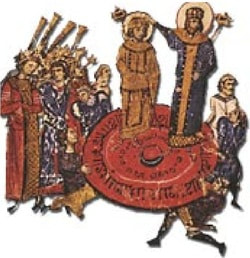
TREATMENT - ACT ONE
The date is the beginning of the 7th century a.d.
The Roman Byzantine Empire is retreating, whereas the Arab Empire, all the tribes united at last, is conquering country after country. Today's middle east is under Hellenized “Roman” domination - paying heavy taxation, and subject to the imposed Roman Byzantine Christian dogma. They are not happy. As the Arab Empire looms, promising and enacting fair taxation and free belief, they find support from all the natives, Christian, Jewish, and Other alike.
Today’s major portion of the Middle East is governed by the Roman Byzantine Christian Emperor and General, Eraklio, whose capital is Constantinople (Byzantium). Eraklio, a 50-60 year old, cultured Greek man, travels back and forth to Syria and across the region. He refuses to accept the decline of the Roman Byzantine Empire. He voices his thoughts and aspirations in poetry that is recognized by many for its merit.
The date is the beginning of the 7th century a.d.
The Roman Byzantine Empire is retreating, whereas the Arab Empire, all the tribes united at last, is conquering country after country. Today's middle east is under Hellenized “Roman” domination - paying heavy taxation, and subject to the imposed Roman Byzantine Christian dogma. They are not happy. As the Arab Empire looms, promising and enacting fair taxation and free belief, they find support from all the natives, Christian, Jewish, and Other alike.
Today’s major portion of the Middle East is governed by the Roman Byzantine Christian Emperor and General, Eraklio, whose capital is Constantinople (Byzantium). Eraklio, a 50-60 year old, cultured Greek man, travels back and forth to Syria and across the region. He refuses to accept the decline of the Roman Byzantine Empire. He voices his thoughts and aspirations in poetry that is recognized by many for its merit.
Camped at the borders of the empire, Khalid ibn al-Walid, a young 20-30 year old man - the rising sun of a rising Empire, Commander of the Arab troops, is conquering Roman Byzantine legions battle after battle.
Older, and somewhat ill, unable to go himself, Eraklio sends his General, Theodore the Sacellarius against him. Theodore could be KhalidÕs brother: handsome, arrogant and self-confident, but without KhalidÕs martial talents.
Well aware of Emperor Eraklio’s military fame, Khalid prepares for the oncoming battle with Theodore. Listening to local gossip, he finds out that Eraklio is a poet. Curious, but contemptuous, certain that the poems could not be good, he commands Amir, a romantic young man in his guard, who is also his friend and aspires to be a warrior like Khalid, to obtain the poems for him to study.
Fascinated by the arts Amir, upon asking, is told by his friends, the local Jewish artisans, that he should go to the Monastery of St. Catherine on Mount Sinai to ask one of the Priests to help him obtain the poems which they can do, as the Monastery is quite the social pivot of the day.
Amir saddles his horse and trots off to the Monastery where he meets one of the Priests, a wise older man, who listens attentively, smiles, and accepts to help him.
Theodore and Khalid engage in battle after battle. Whereas Theodore's legions overwhelm Khalid's smaller army, Khalid's surprise violent attacks slowly take the upper hand.
However to Khalid's dismay, many of the horses of men fallen in battle break free and gallop away, in spite of Amir’s efforts to contain them; a difficult feat in the midst of the fighting.
While Amir is away, Demetrios, a Christian Merchant is brought in for trade.
Khalid is very nervous about buying horses unseen, but he has little choice as horses are needed for battle ... Wily and knowledgeable, Demetrios negotiates the sale of several horses, and maintains his price until the deal is closed and he receives a purse full of gold. The purse itself has a beautifully wrought Arab insignia embroidered on it. He is to deliver the horses in a couple of weeks.
Older, and somewhat ill, unable to go himself, Eraklio sends his General, Theodore the Sacellarius against him. Theodore could be KhalidÕs brother: handsome, arrogant and self-confident, but without KhalidÕs martial talents.
Well aware of Emperor Eraklio’s military fame, Khalid prepares for the oncoming battle with Theodore. Listening to local gossip, he finds out that Eraklio is a poet. Curious, but contemptuous, certain that the poems could not be good, he commands Amir, a romantic young man in his guard, who is also his friend and aspires to be a warrior like Khalid, to obtain the poems for him to study.
Fascinated by the arts Amir, upon asking, is told by his friends, the local Jewish artisans, that he should go to the Monastery of St. Catherine on Mount Sinai to ask one of the Priests to help him obtain the poems which they can do, as the Monastery is quite the social pivot of the day.
Amir saddles his horse and trots off to the Monastery where he meets one of the Priests, a wise older man, who listens attentively, smiles, and accepts to help him.
Theodore and Khalid engage in battle after battle. Whereas Theodore's legions overwhelm Khalid's smaller army, Khalid's surprise violent attacks slowly take the upper hand.
However to Khalid's dismay, many of the horses of men fallen in battle break free and gallop away, in spite of Amir’s efforts to contain them; a difficult feat in the midst of the fighting.
While Amir is away, Demetrios, a Christian Merchant is brought in for trade.
Khalid is very nervous about buying horses unseen, but he has little choice as horses are needed for battle ... Wily and knowledgeable, Demetrios negotiates the sale of several horses, and maintains his price until the deal is closed and he receives a purse full of gold. The purse itself has a beautifully wrought Arab insignia embroidered on it. He is to deliver the horses in a couple of weeks.
Meanwhile, the Priest calls upon Rebecca, a close friend, for help in getting the poems, as the Priest knows that Rebecca, at the bequest of her dead best friend, lives with her best friends’ daughter, Sofia, a young girl they all know and who works in Eraklio’s direct household. Rebecca is Sofia’s “Guardian” since her childhood, and was loved and trusted by her late best friend, Sofia’s mother. The cause seems good, so Rebecca agrees to talk to Sofia.
After a long day at work, Sofia comes home-she touches all the objects she passes, as she suffers from poor sight. Her hand instinctively reaches out for an object but encounters a void. She stops and looks around. Whatever she is looking for is not to be found. Demetrios comes in, he is Sofia’s Father. Within minutes the absence of the missing object is clarified-once again, a gambling debt had to be paid, and selling her dead mother’s last piece of valuable furniture was the timely solution. Father and daughter have a tense fight. To add insult to injury, Rebecca walks in, and Sofia finds out that her Father had a fight with Rebecca as well, as she refused to go and sell the piece for him. He is a busy man, says Demetrios ... and how is he to make money if he has to do everything?
He walks out in a rage, grumbling that no one understands him.
Rebecca and Sofia comfort each other and Rebecca enlists Sofia to obtain Eraklio’s poems.
Choosing the curtains in Eraklio’s suite which is part of her duties, Sofia rapidly retrieves a poem from Eraklio’s desk, just as Theodore and Eraklio walk in discussing their military problems, Sofia leaves the room in a hurry.
Theodore’s pride takes a beating and his anger swells, as he is obliged to report defeat to a disbelieving and shocked Eraklio.
Demetrios arrives with his goods and takes a seat next to Eraklio, who greets him most amicably and takes him to witness over the success of their former campaigns to prod Theodore, who fumes... Demetrios basks in Eraklio's approval and tells wanton jokes with verve as he sells Eraklio precious spice at a high price. Eraklio promises to pay him later - Eraklio grins. It is an established routine, but Demetrios’s smile is forced.
Rebecca and Sofia are on their way to the Monastery. On the way, Rebecca tells Sofia that her mother asked her to be her Guardian, as her mother was afraid for her... what with Demetrios's gambling... Sofia asks about her mother ... Rebecca relies that they were very close ... her face shows her warm feelings.
At the Monastery, the Priest introduces Amir to Sofia. As they meet, Amir is seduced by her vulnerability – and speaks of the fragility of life with eloquence, but declares himself a warrior.... Sofia listens to his words with rapture, then draws his face with her fingers. Deep in the Warrior she senses the Poet. They revel in their cultural differences - as the Priest condones their mission – to enable communication through the sharing of poetry... and Amir leaves with Eraklio’s poem.
As the fighting intensifies, Amir brings Eraklio’s poem to Khalid, who reads it and feels - empathy - for their author. The poem speaks about Eraklio walking into Jerusalem, to obtain the wooden cross; Khalid reads – his eyes glow - it reminds him of the battles he fought to obtain a famous sword ... a parallel forms. His opinion of Eraklio begins to change.
Amir visits the Priest to set up the next meeting. Once done, he wanders around the Monastery admiring the artwork, and by chance, overhears the monks talk of a known man of commerce who deals with Arabs, Jews and
Christians alike. His name is Demetrios....
As the Roman Byzantine forces loose small battle after small battle, Khalid exalts, and his natural arrogance soars. He tells his troops that they will soon conquer the world....
However, there is the matter of the horses – when are they to be delivered? Khalid complains to Amir as he supervises Amir’s training, encouraging him to better himself, however it is obvious that Amir is already doing all he can.
Rebecca and Sofia meet with their Jewish and Christian friends at a colorful wedding ceremony in their town. As the Arabs are taking town after town, the Christians all talk about the eventuality of having to leave for Constantinople, which they do not want to do for several reasons: first they are considering fragmenting from the Roman Byzantine Christians, as they do not agree on important religious matters; secondly, they are happy in their present homes and they all speak with anticipation of the arrival of the Arabs– free religion and tax relief have been promised and the promises are being acted upon in the conquered cities. The Jewish friends are complaining that the Roman Byzantine Ch ristian authorities are pressuring them to convert to Christianity, and they don't want to; the Fragmenting Christian friends (that are to become the Copts) are not happy with this and want a change of the policies. Sofia listens but does not comment due to her affection for her Father who is favorably biased toward any politics or belief Eraklio’s camp has. Thus were the Roman Byzantine Empire to retreat, he would leave for Constantinople, and he would never let her stay behind, as he needs her emotionally.
After the wedding, Rebecca and Sofia ride home. As Sofia talks wistfully about Amir, Rebecca forces Sofia to accept that her father will never LET her go... But Sofia is aware that her father feels a debt, an obligation towards her that still hasn’t been set right.
Meanwhile, sitting around a campfire under the stars with other merchants, Demetrios gambles away all of Khalid’s money.
Demetrios stumbles home in a terrible condition, drunk and angry, ranting about bad luck being his curse. Taken aback – sad and upset, Sofia confronts him about his habits – but he doesn’t tell her about Khalid’s horses. However, Sofia sees the empty purse bearing the Significant Arab insignia on it, which he is holding close to him; and as Demetrios sinks into a stupor, Sofia, attracted by the beauty of the purse, takes it.
Sofia, now using the Arab purse, and Amir meet at the Monastery. This time it is an exchange of Poems. Sofia brings one of Eraklio’s; but surprise - Amir wrote one for Sofia. Although she glories in it, she is very preoccupied, and Amir senses it-Sofia tells him about her father’s gambling, Amir sees the purse and extrapolates that her father is the seller of the horses and warns Sofia of the danger of Khalid’s wrath.
He is not to be toyed with. As they leave, they glimpse an Arab messenger talking amicably to the Priest in regards to some trade.
Khalid and Amir read Eraklio’s poem together - it is a poem about life. Khalid is impressed, and debates its merits with Amir. Khalid listens to Amir’s views on the work with intense interest, while thinking about the man and the life he had. Then, Khalid demands to know when he will get his horses. .. As an afterthought, he asks Amir where he gets the poems... Amir is vague, and hides that Sofia is Demetrios’s daughter.
After a long day at work, Sofia comes home-she touches all the objects she passes, as she suffers from poor sight. Her hand instinctively reaches out for an object but encounters a void. She stops and looks around. Whatever she is looking for is not to be found. Demetrios comes in, he is Sofia’s Father. Within minutes the absence of the missing object is clarified-once again, a gambling debt had to be paid, and selling her dead mother’s last piece of valuable furniture was the timely solution. Father and daughter have a tense fight. To add insult to injury, Rebecca walks in, and Sofia finds out that her Father had a fight with Rebecca as well, as she refused to go and sell the piece for him. He is a busy man, says Demetrios ... and how is he to make money if he has to do everything?
He walks out in a rage, grumbling that no one understands him.
Rebecca and Sofia comfort each other and Rebecca enlists Sofia to obtain Eraklio’s poems.
Choosing the curtains in Eraklio’s suite which is part of her duties, Sofia rapidly retrieves a poem from Eraklio’s desk, just as Theodore and Eraklio walk in discussing their military problems, Sofia leaves the room in a hurry.
Theodore’s pride takes a beating and his anger swells, as he is obliged to report defeat to a disbelieving and shocked Eraklio.
Demetrios arrives with his goods and takes a seat next to Eraklio, who greets him most amicably and takes him to witness over the success of their former campaigns to prod Theodore, who fumes... Demetrios basks in Eraklio's approval and tells wanton jokes with verve as he sells Eraklio precious spice at a high price. Eraklio promises to pay him later - Eraklio grins. It is an established routine, but Demetrios’s smile is forced.
Rebecca and Sofia are on their way to the Monastery. On the way, Rebecca tells Sofia that her mother asked her to be her Guardian, as her mother was afraid for her... what with Demetrios's gambling... Sofia asks about her mother ... Rebecca relies that they were very close ... her face shows her warm feelings.
At the Monastery, the Priest introduces Amir to Sofia. As they meet, Amir is seduced by her vulnerability – and speaks of the fragility of life with eloquence, but declares himself a warrior.... Sofia listens to his words with rapture, then draws his face with her fingers. Deep in the Warrior she senses the Poet. They revel in their cultural differences - as the Priest condones their mission – to enable communication through the sharing of poetry... and Amir leaves with Eraklio’s poem.
As the fighting intensifies, Amir brings Eraklio’s poem to Khalid, who reads it and feels - empathy - for their author. The poem speaks about Eraklio walking into Jerusalem, to obtain the wooden cross; Khalid reads – his eyes glow - it reminds him of the battles he fought to obtain a famous sword ... a parallel forms. His opinion of Eraklio begins to change.
Amir visits the Priest to set up the next meeting. Once done, he wanders around the Monastery admiring the artwork, and by chance, overhears the monks talk of a known man of commerce who deals with Arabs, Jews and
Christians alike. His name is Demetrios....
As the Roman Byzantine forces loose small battle after small battle, Khalid exalts, and his natural arrogance soars. He tells his troops that they will soon conquer the world....
However, there is the matter of the horses – when are they to be delivered? Khalid complains to Amir as he supervises Amir’s training, encouraging him to better himself, however it is obvious that Amir is already doing all he can.
Rebecca and Sofia meet with their Jewish and Christian friends at a colorful wedding ceremony in their town. As the Arabs are taking town after town, the Christians all talk about the eventuality of having to leave for Constantinople, which they do not want to do for several reasons: first they are considering fragmenting from the Roman Byzantine Christians, as they do not agree on important religious matters; secondly, they are happy in their present homes and they all speak with anticipation of the arrival of the Arabs– free religion and tax relief have been promised and the promises are being acted upon in the conquered cities. The Jewish friends are complaining that the Roman Byzantine Ch ristian authorities are pressuring them to convert to Christianity, and they don't want to; the Fragmenting Christian friends (that are to become the Copts) are not happy with this and want a change of the policies. Sofia listens but does not comment due to her affection for her Father who is favorably biased toward any politics or belief Eraklio’s camp has. Thus were the Roman Byzantine Empire to retreat, he would leave for Constantinople, and he would never let her stay behind, as he needs her emotionally.
After the wedding, Rebecca and Sofia ride home. As Sofia talks wistfully about Amir, Rebecca forces Sofia to accept that her father will never LET her go... But Sofia is aware that her father feels a debt, an obligation towards her that still hasn’t been set right.
Meanwhile, sitting around a campfire under the stars with other merchants, Demetrios gambles away all of Khalid’s money.
Demetrios stumbles home in a terrible condition, drunk and angry, ranting about bad luck being his curse. Taken aback – sad and upset, Sofia confronts him about his habits – but he doesn’t tell her about Khalid’s horses. However, Sofia sees the empty purse bearing the Significant Arab insignia on it, which he is holding close to him; and as Demetrios sinks into a stupor, Sofia, attracted by the beauty of the purse, takes it.
Sofia, now using the Arab purse, and Amir meet at the Monastery. This time it is an exchange of Poems. Sofia brings one of Eraklio’s; but surprise - Amir wrote one for Sofia. Although she glories in it, she is very preoccupied, and Amir senses it-Sofia tells him about her father’s gambling, Amir sees the purse and extrapolates that her father is the seller of the horses and warns Sofia of the danger of Khalid’s wrath.
He is not to be toyed with. As they leave, they glimpse an Arab messenger talking amicably to the Priest in regards to some trade.
Khalid and Amir read Eraklio’s poem together - it is a poem about life. Khalid is impressed, and debates its merits with Amir. Khalid listens to Amir’s views on the work with intense interest, while thinking about the man and the life he had. Then, Khalid demands to know when he will get his horses. .. As an afterthought, he asks Amir where he gets the poems... Amir is vague, and hides that Sofia is Demetrios’s daughter.
ACT two
please, feel free to contact us to read more about Sanctuary's treatment
please, feel free to contact us to read more about Sanctuary's treatment
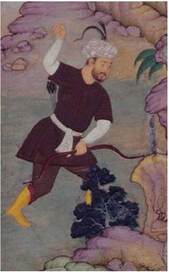
CHARACTERS
KHALID IBN AL-WALID
Late twenties-early thirties. The character of Khalid represents the qualities of youth and leadership. Confident, know -it-all, but curious, wanting knowledge-loving action. Aggressive and violent, yet with a certain tender heartedness for the subjects that he can empathize with. At first, Khalid feels contempt for the older general who he knows is going to have to retreat; thus be defeated, which, in youth’s vocabulary means that a man has lost all value. Khalid has little understanding at first of what it means for a man to have built, conquered, and then having to admit defeat. Neither the nostalgia, nor the success of having accomplished what the old general set out to do at first has intrinsic merit. Only at the end of our story does Khalid understand that Eraklio, being able to admit defeat, then deal with it gracefully, is very worthy, and that such behavior shows a strength of character as great as the strength needed to be able to conquer.
Khalid’s brashness is tempered when he learns that the older man writes poetry. Ancestral Arab love for poetry and to better know his enemy and sheer curiosity, make him want to read the poems. However, what he discovers in the writings of the man makes Eraklio humane and opens a window on life through which Khalid perceives what age brings in wisdom in addition to the extraordinary life Eraklio had; and slowly his contempt turns to understanding, and then to a contained admiration. His attitude towards life also undergoes a change as he sees that power is not a constant in time-and that empires rise and fall-and it is how a man reacts to events that define him. Thus KhalidÕs first desire to conquer the general and destroy him, turns to wanting him to go back gracefully to the empire from whence he came and he wants the man to keep his dignity. The poems having inspired him with a window into Eraklio’s soul where he discovers a love for courage, his country, and Syria.
Khalid is a man’s man. He is feared by his men, but his men’s loyalty stems from admiration. He’s renown as the best horsemen in Arabia, he learned to ride as a child and excels in the use of weapons like the spear, the lance, the bow, and the sword, which he reveres and in which he is incredible. He is over six-foot tall. His goal is to conquer, his fear is to fail, though he would never admit to any such possibility. War is his life. Military strategy is his one extraordinary talent.
When Khalid finds out that Sofia is the daughter of the man who sold him the horses he did not deliver, his rage is boundless, and he holds Amir responsible.
Thus Khalid's relationship with Eraklio is that of the young man and the older man-a relationship well sung in Neil Young’s ‘Old man take a look at my life...” and Cat Stevens’s “Father and Son’.
KHALID IBN AL-WALID
Late twenties-early thirties. The character of Khalid represents the qualities of youth and leadership. Confident, know -it-all, but curious, wanting knowledge-loving action. Aggressive and violent, yet with a certain tender heartedness for the subjects that he can empathize with. At first, Khalid feels contempt for the older general who he knows is going to have to retreat; thus be defeated, which, in youth’s vocabulary means that a man has lost all value. Khalid has little understanding at first of what it means for a man to have built, conquered, and then having to admit defeat. Neither the nostalgia, nor the success of having accomplished what the old general set out to do at first has intrinsic merit. Only at the end of our story does Khalid understand that Eraklio, being able to admit defeat, then deal with it gracefully, is very worthy, and that such behavior shows a strength of character as great as the strength needed to be able to conquer.
Khalid’s brashness is tempered when he learns that the older man writes poetry. Ancestral Arab love for poetry and to better know his enemy and sheer curiosity, make him want to read the poems. However, what he discovers in the writings of the man makes Eraklio humane and opens a window on life through which Khalid perceives what age brings in wisdom in addition to the extraordinary life Eraklio had; and slowly his contempt turns to understanding, and then to a contained admiration. His attitude towards life also undergoes a change as he sees that power is not a constant in time-and that empires rise and fall-and it is how a man reacts to events that define him. Thus KhalidÕs first desire to conquer the general and destroy him, turns to wanting him to go back gracefully to the empire from whence he came and he wants the man to keep his dignity. The poems having inspired him with a window into Eraklio’s soul where he discovers a love for courage, his country, and Syria.
Khalid is a man’s man. He is feared by his men, but his men’s loyalty stems from admiration. He’s renown as the best horsemen in Arabia, he learned to ride as a child and excels in the use of weapons like the spear, the lance, the bow, and the sword, which he reveres and in which he is incredible. He is over six-foot tall. His goal is to conquer, his fear is to fail, though he would never admit to any such possibility. War is his life. Military strategy is his one extraordinary talent.
When Khalid finds out that Sofia is the daughter of the man who sold him the horses he did not deliver, his rage is boundless, and he holds Amir responsible.
Thus Khalid's relationship with Eraklio is that of the young man and the older man-a relationship well sung in Neil Young’s ‘Old man take a look at my life...” and Cat Stevens’s “Father and Son’.
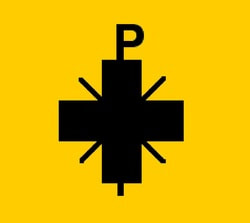
ERAKLIO
In his late fifties, blond with blue eyes, Eraklio is the Older Man-hardened by life-wise, looking back at the past with a nostalgic smile-envious in spite of himself of Khalid as he was in the young man’s shoes before and would wish to be in them again, for all the reasons that be; Eraklio was strong enough to fight lions bare handed as a youth. With hindsight, Eraklio is also aware of the limitations that youth brings with it. He would like to give it the indulgence it may merit but cannot afford to do so. He is conscious that his position is strategically bad and that the time for retreat has come. He is aware of the closing of the cycle, and the military cycle is indicative of his personal life’s cycle which, reaching the onset of the 3rd age, he looks back and life takes on that vivid meaning (of Khalid's age) that he so env ies. However, although he is a realist and a pragmatist - he still believes that there may be divine intervention - that good luck and God’s grace will come into play and that he will win.
Vain and proud of his past conquests, Eraklio has himself called the "King of Kings", and as Basileus the standard Greek word for "monarch".
A controlling man, he also perceives the empire as a continuity of himself, who is of Greek culture. He Hellenized the Empire, and everything around him, by largely discontinuing the use of Latin as its official language, and replacing it with Greek. He is a microcosm of the cultural traits of the Greek-Roman.
A Christian, one of his poems speaks of his days of glory, how (in 630) at the height of his power, he marched barefoot as a pious Christian into Jerusalem and restored the True Cross to the Church of the Holy Sepulcher. This poem allows us to understand Sofia’s feelings towards her Father’s past. (see Sofia).
Eraklio’s religious attempt to unify because of his will to control causes fractions in the camp-and, as the day of retreat dawns, a significant number of Christians decide to stay behind, including Sofia.
He fears retreat - he fears water...
In his late fifties, blond with blue eyes, Eraklio is the Older Man-hardened by life-wise, looking back at the past with a nostalgic smile-envious in spite of himself of Khalid as he was in the young man’s shoes before and would wish to be in them again, for all the reasons that be; Eraklio was strong enough to fight lions bare handed as a youth. With hindsight, Eraklio is also aware of the limitations that youth brings with it. He would like to give it the indulgence it may merit but cannot afford to do so. He is conscious that his position is strategically bad and that the time for retreat has come. He is aware of the closing of the cycle, and the military cycle is indicative of his personal life’s cycle which, reaching the onset of the 3rd age, he looks back and life takes on that vivid meaning (of Khalid's age) that he so env ies. However, although he is a realist and a pragmatist - he still believes that there may be divine intervention - that good luck and God’s grace will come into play and that he will win.
Vain and proud of his past conquests, Eraklio has himself called the "King of Kings", and as Basileus the standard Greek word for "monarch".
A controlling man, he also perceives the empire as a continuity of himself, who is of Greek culture. He Hellenized the Empire, and everything around him, by largely discontinuing the use of Latin as its official language, and replacing it with Greek. He is a microcosm of the cultural traits of the Greek-Roman.
A Christian, one of his poems speaks of his days of glory, how (in 630) at the height of his power, he marched barefoot as a pious Christian into Jerusalem and restored the True Cross to the Church of the Holy Sepulcher. This poem allows us to understand Sofia’s feelings towards her Father’s past. (see Sofia).
Eraklio’s religious attempt to unify because of his will to control causes fractions in the camp-and, as the day of retreat dawns, a significant number of Christians decide to stay behind, including Sofia.
He fears retreat - he fears water...
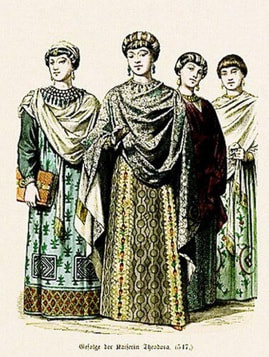
SOFIA
Late twenties, early thirties. Seeks simplicity and morality. Saddled with poor sight, she is dependent on Rebecca, her Jewish “Guardian” who was left to care for her by her mother with whom Rebecca was close friends. Sofia has a sensitive poetic soul, is finely attuned to beauty in any shape or form, and has the ability to see auras. Every time Sofia hears a poem she can relate to, we enter into her inner world that much resembles an Arabic, Klimtesque, mosaic.
She is deeply unhappy at what she intuits her father is up to. She is proud of her father’s past as he accompanied Eraklio in his campaigns and to Jerusalem, but is deeply ashamed of the results of his gambling. Her fear is to hurt her father-yet she knows she will have to.
She loathes deceit in any form, and backs away at her father’s intellectualization and word play. She shies away from his religious ambiguities-changing as per his commerce and morals need. But she is afraid of leaving him and of the hurt that she will cause him, and of leaving the familiar comfort zone, Very moral, when she finds out he has put her into danger because of his gambling, she cannot take his side but insists on shielding him from others. She listens and knows of the various religious differences (including the Persian) and decides that there is only one god and develops an intimate belief of her own - one that refuses a name. She asks Amir to take her as she is - she will never convert to any of the religions...but she will love his too. She is attracted by the unknown, by the exotic. She falls in love with Amir because of his ability to vocalize images and paint the world.
Late twenties, early thirties. Seeks simplicity and morality. Saddled with poor sight, she is dependent on Rebecca, her Jewish “Guardian” who was left to care for her by her mother with whom Rebecca was close friends. Sofia has a sensitive poetic soul, is finely attuned to beauty in any shape or form, and has the ability to see auras. Every time Sofia hears a poem she can relate to, we enter into her inner world that much resembles an Arabic, Klimtesque, mosaic.
She is deeply unhappy at what she intuits her father is up to. She is proud of her father’s past as he accompanied Eraklio in his campaigns and to Jerusalem, but is deeply ashamed of the results of his gambling. Her fear is to hurt her father-yet she knows she will have to.
She loathes deceit in any form, and backs away at her father’s intellectualization and word play. She shies away from his religious ambiguities-changing as per his commerce and morals need. But she is afraid of leaving him and of the hurt that she will cause him, and of leaving the familiar comfort zone, Very moral, when she finds out he has put her into danger because of his gambling, she cannot take his side but insists on shielding him from others. She listens and knows of the various religious differences (including the Persian) and decides that there is only one god and develops an intimate belief of her own - one that refuses a name. She asks Amir to take her as she is - she will never convert to any of the religions...but she will love his too. She is attracted by the unknown, by the exotic. She falls in love with Amir because of his ability to vocalize images and paint the world.
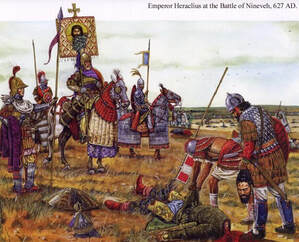
AMIR
Late twenties, early thirties, Amir is a military man, but with the heart of a poet. Although his ambition is to be a great Warrior, he is actually a great Poet and that is his journey’s discovery. His principle ability is words – he can convey universes. His vocabulary is expansive and precise – and filled with imagery. His voice is soothing and he speaks with a melody that appeals to Sofia. When he listens to her, she can feel he grasps her Universe. He is very generous, and loyal. When his love for Sofia, whose vulnerability appeals to him, is endangered because of her father, and he has to either give her up to Khalid, or betray his commander’s trust, he sinks into deep depression. However, he is aware he must do the right thing, and at the end does what needs to be done.
Unable to choose, in complete despair, he finally decides to put his life at risk by begging Khalid’s mercy for the daughter of the Horse Thief – and describes his love for her in such beautiful, poetic, terms that Khalid cannot resist and allows him to stay with her and “absolves” her of her father’s crime – but the punishment is that Amir will have to leave the army – which triggers Sofia’s final decision to stay; and Amir’s recognition of his real self
Late twenties, early thirties, Amir is a military man, but with the heart of a poet. Although his ambition is to be a great Warrior, he is actually a great Poet and that is his journey’s discovery. His principle ability is words – he can convey universes. His vocabulary is expansive and precise – and filled with imagery. His voice is soothing and he speaks with a melody that appeals to Sofia. When he listens to her, she can feel he grasps her Universe. He is very generous, and loyal. When his love for Sofia, whose vulnerability appeals to him, is endangered because of her father, and he has to either give her up to Khalid, or betray his commander’s trust, he sinks into deep depression. However, he is aware he must do the right thing, and at the end does what needs to be done.
Unable to choose, in complete despair, he finally decides to put his life at risk by begging Khalid’s mercy for the daughter of the Horse Thief – and describes his love for her in such beautiful, poetic, terms that Khalid cannot resist and allows him to stay with her and “absolves” her of her father’s crime – but the punishment is that Amir will have to leave the army – which triggers Sofia’s final decision to stay; and Amir’s recognition of his real self
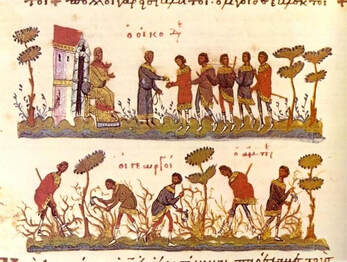
DEMETRIOS
In his fifties, Sofia’s father is one of Eraklio’s followers and admirers. He is quite charming, and funny, when he wants to be, which is his main asset and helps him out in many situations. Demetrios is an avid commercial trader, who will not hesitate to take advantage of a situation.
He rationalizes all morality and behavior by complicating everything intellectually – he seeks refuge in irresolvable intricacy. Heavy – but not fat, he is commercially active among all the social/religious communes. His speech is pompous – but he is not a premeditating crook. He loves his daughter deeply and is jealous of all who come close to her except for Rebecca.
Deeper and deeper into dangerous gambling and subsequent debt, he sells horses to Khalid, and can’t deliver them as he loses the money in a game. Compulsively, Demetrios carries on without restraint and even looses more, the money that could have saved him and his family. His gambling and beliefs (secondary to his gambling) oblige him to leave the region, and force his daughter to choose between leaving with him, or staying for love.
He uses his difference of belief as a reason to try to leave the region gracefully whereas all know that his gambling has made it impossible for him to stay, as he would be slaughtered. This manner of obfuscating truth helps Sofia, via parental rejection, in making the right choices for her.
In his fifties, Sofia’s father is one of Eraklio’s followers and admirers. He is quite charming, and funny, when he wants to be, which is his main asset and helps him out in many situations. Demetrios is an avid commercial trader, who will not hesitate to take advantage of a situation.
He rationalizes all morality and behavior by complicating everything intellectually – he seeks refuge in irresolvable intricacy. Heavy – but not fat, he is commercially active among all the social/religious communes. His speech is pompous – but he is not a premeditating crook. He loves his daughter deeply and is jealous of all who come close to her except for Rebecca.
Deeper and deeper into dangerous gambling and subsequent debt, he sells horses to Khalid, and can’t deliver them as he loses the money in a game. Compulsively, Demetrios carries on without restraint and even looses more, the money that could have saved him and his family. His gambling and beliefs (secondary to his gambling) oblige him to leave the region, and force his daughter to choose between leaving with him, or staying for love.
He uses his difference of belief as a reason to try to leave the region gracefully whereas all know that his gambling has made it impossible for him to stay, as he would be slaughtered. This manner of obfuscating truth helps Sofia, via parental rejection, in making the right choices for her.
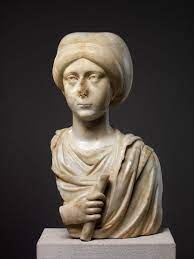
REBECCA
Is a middle-aged, average looking, Jewish lady who was close friends with Sofia’s mother, and became Sofia’s “Guardian” upon the mother’s request, as the mother knew that Demetrios’s gambling would be a problem in the future. She took care of Sofia as of her childhood and helped with the moving around imposed by the gambling, and sometimes financially. She has a proprietary view of Sofia and resents Demetrios on one hand, but is forgiving on the other... she does think that
Sofia is better off alone. Rebecca is a strong character, with a decisive will-power that will not be swayed into doing anything she does not want. She likes and assumes responsibility.
Is a middle-aged, average looking, Jewish lady who was close friends with Sofia’s mother, and became Sofia’s “Guardian” upon the mother’s request, as the mother knew that Demetrios’s gambling would be a problem in the future. She took care of Sofia as of her childhood and helped with the moving around imposed by the gambling, and sometimes financially. She has a proprietary view of Sofia and resents Demetrios on one hand, but is forgiving on the other... she does think that
Sofia is better off alone. Rebecca is a strong character, with a decisive will-power that will not be swayed into doing anything she does not want. She likes and assumes responsibility.
Sanctuary Copyright: © Kyra Pahlen library of Congress , Washington DC
Letters & Email, as mean of recognized interest and appreciation from high profile exponents of the three religionsognized interest and appreciationRecognized interest and appreciationRecognized interest and appreciation

